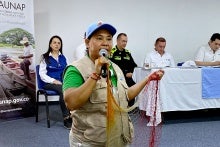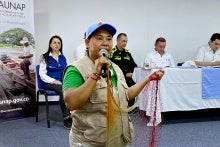As temperatures reach new highs and climate change impacts intensify, women who are defending their land, water and ecosystems are paying a high price.
“I have suffered three attempts on my life because of my work as an environmental defender,” said Yuli Velázquez, who works with the fishing communities of Santander, in northern Colombia.
“We protested against irregularities in a contract to clean up the San Silvestre swamp, for which a hydrocarbon company gave 5 billion pesos,” explained Velázquez, who is the president of the Federation of Artisanal, Environmental and Tourist Fisherfolk of the Department of Santander (FEDEPESAN).
Velázquez lives in Barrancabermeja, less than a kilometer from the San Silvestre swamp, where she grew up fishing. She and others in the community fish in the marshes and the rivers nearby. They want the local authorities to test the water and sludge for contamination.
“We catch less fish now,” said Velázquez. “This year we have seen animals, even cows and buffalos, fish and birds dying. The West Indian manatees are on the way to extinction, we have proof of all of this.”
Velázquez started fishing when she was five years old, with her mother and grandparents.
“Before the attacks, we used to go fishing every day at night, because that was the best time to fish,” she shared. Now, she goes fishing three times a week, and only during the day. The risks are too high.
In 2020, Velázquez experienced the first attack in her home. Other women in the community have also been threatened and attacked, often in front of their children.
In June 2024, Velázquez received the Amnesty International Germany’s Human Rights Award on behalf of FEDEPESAN, bringing them international recognition. Since then, FEDEPESAN has filed a public lawsuit against the hydrocarbon company for polluting the water and endangering the ecosystem.
The threats to Velázquez’s life have continued, and she cannot move around without a bulletproof vest, an armored vehicle, and security officials.
Climate change and environmental defenders
Climate change impacts lives, culture and livelihoods of millions of women and their communities. By 2050, climate change may push up to 158 million more women and girls into poverty.
Yet, women human rights defenders, grassroots feminist groups and indigenous women are routinely sidelined in climate negotiations and decision-making. When they defend their environment, they face bullying, harassment, and violence.
As of January 2022, at least a quarter of all socio-environmental conflicts worldwide involved women environmental defenders, and in 81 conflicts, they were killed.
A new report by Global Witness shows that an estimated 196 land and environmental defenders were killed in 2023, and for the second year running, Colombia ranked as the most dangerous place for environmental defenders, with a record 79 killed.
For the nearly 100 fisherwomen who are members of FEDEPESAN, fishing is a way of life, livelihood, and food security. To mitigate the rising risks because of their activism, they frequently change their schedule and routes for fishing and water monitoring.
“Fishing for us means preserving the ancestral [heritage], what our grandparents taught us. They used to say, “If we live next to the swamp, we have food,” explained Velázquez. “With fishing we have a guaranteed job, and in my case, I have been able to give my children an education. Also, this work allows us to take care of the environment.”
Fishing ensures food security for the families in this area. After keeping some fish for household consumption, the women trade the rest for income and other food items.
Biodiversity, conservation, and the role of women
Velázquez and other women in the community teach the next generations how to care for the environment. When they saw garbage being thrown in the river and the swamp, they started raising awareness in the communities near the river about composting and safer ways of waste disposal. They clean the swamp three times a year.
“My grandmother taught me since I was a child to take care of the Magdalena River,” explained Velázquez. “She told me that if we take care of the river, we will have food, so we should not throw garbage, trammel nets, or (over)fish. If I go fishing and catch just enough, I go home, I don’t overfish.”
Velázquez also teaches her children about gender equality: “I have a son and a daughter, and from a very early age, I taught them that housework is everyone’s responsibility and that activities like fishing can be done equally by men and women.”
The artisanal fishing sector has a lot of entrenched sexism, and FEDEPESAN works with men and women to improve their understanding of gender issues. “We have managed to reduce violence against women, because they receive education and training to be aware that violence in the home is not normal. Men have also started to appreciate our work. They know that we can be as good or better than them in fishing,” she shared.
How UN Women works with environmental defenders
Yuli Velázquez is part of a new UN Women programme, Mujeres cambiando su mundo (Women changing their world), funded by the Government of Germany and implemented in partnership with the Government of Colombia. Starting in Cauca and Magdalena Medio this year, the programme recognizes the work of women environmental defenders and creates a safe and enabling environment for their advocacy and protects their livelihoods. It is also working with national and local authorities to improve protection of the rights of women environmental leaders and defenders and to facilitate their participation in decision-making.
For UN Women, the programme is critical for lasting peace in Colombia. “The climate crisis fuels conflict, social unrest, and migration. The women environmental and human rights defenders are leaders on the front line of this crisis,” said Bibiana Aído, UN Women Representative in Colombia. “The local knowledge, lived experience, and leadership that these leaders bring must be at the centre of all decisions made at local, national and regional levels for protecting the environment and maintaining peace.”
The programme has sparked hope for Velázquez, who dreams of living in peace with nature: “My dream as a woman and an environmentalist is to be able to show my grandchildren the places we have fought so hard for: to show them the manatees and monkeys I have cared for.”
From 21 October to 1 November, the UN Convention on Biological Diversity (UNCBD) COP16 will take place in Cali, Colombia, where UN Women will organize a side event titled, ‘Defending the women who defend the planet’. The event will highlight the important role of women environmental human rights defenders like Yuli Velázquez who dedicate their lives to defending their land and protecting biodiversity.

